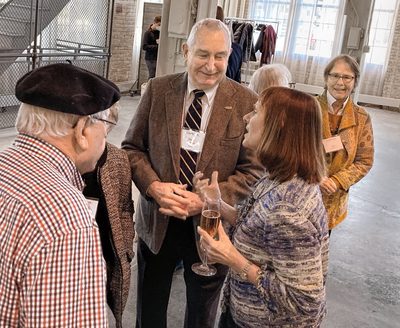
It has been great to get to know Carleton alumni in a variety of venues over the course of the year, and to find, not surprisingly, that they are a lot like grown-up Carleton students. Thoughtful, curious, kind, and deeply engaged in a wide range of issues and activities, they ask good questions and want forthright answers.
This spring, I traveled around the country and met alumni in small groups and large gatherings, including alumni and parent receptions in San Francisco, Chicago, New York, and Minneapolis. It was exhilarating and moving to see the tremendous energy and joy that Carls from 1954 to 2023 showed when coming together after a long time apart. Clusters of friends greeting each other with hugs, Carls who have never met chatting like old friends, parents swapping stories about their students’ experiences back on campus, and eager prospective students enjoying a deep dive into all things Carleton.
Carleton alumni, I have also learned, are not interested in cocktail party chatter—even when at a cocktail party! Rather than discussing their trips or the weather, they talk with great animation about current events, professional challenges, or interesting books and films. In the same vein, I appreciate that the questions alumni ask after my formal remarks are never nostalgic looks back at the Carleton of their past, but probing questions about the Carleton of tomorrow.
At every alumni gathering and at the multiple reunions we held on campus, there were thoughtful queries focused on the college’s recently completed IDE Plan. Some wondered about our approach to specific goals, like diversity in faculty hiring or our efforts to recruit more students from low-income families. Others wanted to know more generally how the plan was being received on campus, and what challenges I thought we might encounter in implementing it. When answering, I often noted the strength of Carleton’s culture, and how the very warmth and intimacy of the community could make it hard for those who love it to imagine why it might not feel that familiar and welcoming to everyone.
For example, the challenge of recognizing the wide range of Carleton experiences comes through in alumni questions about the plan’s recommendation for a Black Center, one of the earliest demands articulated by students in 2020. Some alumni have asked why such a center should be needed and worry that providing a separate space for Black students could prove divisive. I have noted that research has established that when underrepresented groups have the opportunity to focus on their own identities and concerns, the whole community benefits.
Majority students already have that opportunity in a campus largely shaped by their interests and needs. Providing individual groups with opportunities to come together and share their experiences allows all students to flourish as part of the broader community.
This question is emblematic of the kinds of issues we will continue to grapple with as we pursue our goals for fostering a more inclusive and equitable community. Making progress will require us to look beyond the experiences of the past to the demands of the present, and to listen to students when they tell us what they need to succeed.
I am grateful for the thoughtful and energizing exchanges I have had with many of you already, and look forward to many good conversations in the years ahead. Thank you for your commitment to the Carleton of the future.
